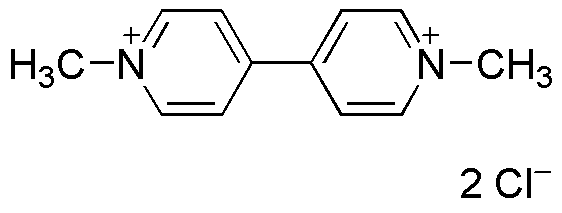As one of the world’s largest agricultural producing countries, the U.S. is known for using some of the most advanced farming products and technology in the world. From sophisticated machinery to powerful chemical agents, a great deal of time and money is spent maximizing crop output to meet a global demand.
However, the long-term safety of these products has been a growing concern – particularly among farm and agricultural workers. Numerous studies have uncovered significant health risks associated with industrial and commercial agricultural chemicals. One of the most alarming examples is the allegation that exposure to the herbicide Paraquat can lead to an increased risk of developing Parkinson’s Disease.
What is Paraquat?

Paraquat chemical formula
Paraquat Dichloride (commonly known as Paraquat) is a potent herbicide that gained widespread usage following World War II due to its speed and effectiveness in killing weeds and grass. It remains one of the most popular herbicides in the U.S., where nearly 11 million pounds of the chemical are sprayed on various crops annually. Additionally, Paraquat is sold under various brand names in the U.S., including Ortho Paraquat and Gramoxone.
What is Parkinson’s Disease?
As one of the most prevalent and severe progressive nervous system disorders, patients afflicted with Parkinson’s Disease often experience gradual loss of muscle control and movement. Parkinson’s Disease frequently presents itself with initial symptoms ranging from minor trembles to stiffness and impaired movement. In its advanced stages, Parkinson’s Disease can impair movement and motor functions to the point where the patient requires a wheelchair or is bedridden.
In addition to nervous system damage, many patients report further complications of the disease, including difficulty sleeping, depression, cognitive problems such as dementia, and hallucinations.
There is currently no cure for Parkinson’s Disease, though medical treatment may make the symptoms more manageable for some.
What is the Link Between Paraquat and Parkinson’s Disease?
The link between Paraquat and an increased risk of developing Parkinson’s Disease has been well-documented through numerous scientific studies. The first piece of research to establish the link was published by the journal of Cell Death and Differentiation in 2010. The initial study determined an association between Parkinson’s Disease and Paraquat exposure but concluded that more research was necessary to establish an increased risk.
Later studies would further deepen the connection between the two, including a 2018 study conducted by researchers from the University of Guelph which determined that low-level exposure to pesticides and herbicides like Paraquat could mimic the effects of mutations known to cause Parkinson’s Disease.
In 2019, a systematic analysis of the available research determined that the occurrence of Parkinson’s Disease was 25 percent greater in participants who have been exposed to Paraquat.
And while most of the data agrees that farmers and agricultural workers who were directly exposed to the chemical are at the greatest risk, they may not be the only group with reason for concern. Early research published in the American Journal of Epidemiology suggested that applying the chemical within 500 meters of a home may increase the risks of residents developing Parkinson’s Disease.
Is Paraquat Still Legal in the U.S.?
Several countries around the world have banned Paraquat due to the connection between the chemical and Parkinson’s uncovered by researchers, including Switzerland and European Union nations. However, the United States Environmental Protection Agency (EPA) has been slow to condemn Paraquat or its various brand names. Paraquat is still readily available and widely used in the U.S., though the EPA did propose additional protections against Paraquat such as prohibiting aerial and pressurized backpack sprayer application. Despite this, several lawmakers have moved to establish laws that would ban Paraquat in the U.S., such as the Protect Against Paraquat Act.
Take Action Today
If you have been exposed to Paraquat and have been diagnosed with Parkinson’s Disease, there are actions you can take to seek justice. Wexler Wallace is currently investigating claims related to Parkinson’s Disease and Paraquat. As one of the law firms overseeing litigation against similar toxic agricultural products, Wexler Wallace has experience holding powerful corporations responsible for public harm.
0 Comments